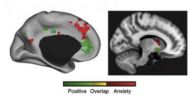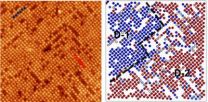(Press-News.org) People choosing between two or more equally positive outcomes experience paradoxical feelings of pleasure and anxiety, feelings associated with activity in different regions of the brain, according to research led by Amitai Shenhav, an associate research scholar at the Princeton Neuroscience Institute at Princeton University.
In one experiment, 42 people rated the desirability of more than 300 products using an auction-like procedure. Then they looked at images of paired products with different or similar values and were asked to choose between them. Their brain activity was scanned using functional magnetic resonance imaging (fMRI). After the scan, participants reported their feelings before and during each choice. They received one of their choices at the end of the study.
Choices between two highly valued items (high-high), such as a digital camera and a camcorder, were associated with the most positive feelings and the greatest anxiety, compared with choices between items of low value (low-low), like a desk lamp and a water bottle, or between items of different values (low-high). Functional MRI scans showed activity in two regions of the brain, the striatum and the prefrontal cortex, both known to be involved in decision-making. Interestingly, lower parts of both regions were more active when subjects felt excited about being offered the choice, while activity in upper parts was strongly tied to feelings of anxiety.
This evidence that parallel brain circuits are associated with opposing emotional reactions helps to answer a puzzling question, according to Shenhav: "Why isn't our positivity quelled by our anxiety, or our anxiety quelled by the fact that we're getting this really good thing at the end? This suggests that it's because these circuits evolved for two different reasons," he said. "One of them is about evaluating the thing we're going to get, and the other is about guiding our actions and working out how difficult the choice will be."
The study, "Neural correlates of dueling affective reactions to win-win choices," was published July 14 in the Proceedings of the National Academy of Sciences. Shenhav conducted the research as a graduate student at Harvard University, along with Professor of Psychology and Neuroscience Randy Buckner, the study's senior author.
A second fMRI experiment showed that the same patterns of emotional reactions and brain activity persisted even when the participants were told before each choice how similarly they had valued the items. Their anxiety didn't abate, despite knowing how little they stood to lose by making a "wrong" choice. In a third experiment, Shenhav and Buckner tested whether giving people more than two choices increased their levels of anxiety. Indeed, they found that providing six options led to higher levels of anxiety than two options, particularly when all six of the options were highly valued items. But positive feelings about being presented with the choice were similar for two or six options.
This suggests that the anxiety stems from the conflict of making the decision, rather than the opportunity cost of the choice — an economic concept that refers to the lost value of the second-best option. The opportunity cost should be the same, regardless of the number of choices. In addition, subjects in this final study were given an unlimited amount of time to make a decision, compared with 1.5 seconds in the first two studies. The results showed that time pressure was not the main source of anxiety during the choices.
At the end of each study, participants had a surprise opportunity to reverse their earlier choices. Higher activity in a part of the brain called the anterior cingulate cortex around the time of an initial choice predicted whether that decision would later be reversed. Previous work has shown that this brain region is involved in assessing how conflicted an individual feels over a particular choice; this result suggests that some choices may have continued to elicit conflict after the participant made a decision, Shenhav said. The researchers also found that people who reported more anxiety in their daily lives were more likely to change their minds.
This work could explain why ostensibly positive options can evoke a mixture of positive and negative responses, which are not explained by purely economic analyses of choice. "Rationally, there's no reason why when you put one good thing with another good thing, you should feel worse about the situation," said Brian Knutson, an associate professor of psychology and neuroscience at Stanford University, who is familiar with the work but was not involved in it. "The neuroimaging tells us that these different mechanisms are fighting with each other," he said. "Understanding that dynamic can help us understand why decisions that we think should make us feel better can actually make us feel worse."
According to Shenhav, this research could shed light on the neural processes that can make more momentous choices so paralyzing for some people — for instance, deciding where to go to college or which job offer to take. But he admits that even more trivial decisions can be tough for him. "I probably experience more win-win choice anxiety than the average person," he said. "I'm even terrible at choosing where to eat dinner."
INFORMATION:
Shenhav's research was supported by Harvard University and a fellowship from the Mortimer and Theresa Sackler Foundation. Shenhav is a C.V. Starr Fellow at the Princeton Neuroscience Institute.
Brain's dynamic duel underlies win-win choices
2014-07-24
ELSE PRESS RELEASES FROM THIS DATE:
TGen-led study seeks to understand why some HIV-positive men are more infectious
2014-07-24
FLAGSTAFF, Ariz. — July 24, 2014 — A new study led by the Translational Genomics Research Institute (TGen) provides insights into the interplay among bacteria, viruses and the immune system during HIV infection.
Currently, doctors measure HIV-positive men's infectivity — their potential to infect others — based on their blood viral load. However, some men produce large amounts of virus in their semen despite having low levels in their blood. Researchers call this "compartmentalization," where different levels of the virus can be found in different parts of the body; in ...
Parched West is using up underground water, UCI, NASA find
2014-07-24
Irvine, Calif., July 24, 2014 — A new study by University of California, Irvine and NASA scientists finds more than 75 percent of the water loss in the drought-stricken Colorado River Basin since late 2004 came from underground resources. The extent of groundwater loss may pose a greater threat to the water supply of the western United States than previously thought.
This study is the first to quantify the amount that groundwater contributes to the water needs of western states. According to the U.S. Bureau of Reclamation, the federal water management agency, the basin ...
ORNL study reveals new characteristics of complex oxide surfaces
2014-07-24
OAK RIDGE, Tenn., July 24, 2014 -- A novel combination of microscopy and data processing has given researchers at the Department of Energy's Oak Ridge National Laboratory an unprecedented look at the surface of a material known for its unusual physical and electrochemical properties.
The research team led by ORNL's Zheng Gai examined how oxygen affects the surface of a perovskite manganite, a complex material that exhibits dramatic magnetic and electronic behavior. The new avenue to understand surface behavior could benefit researchers who are interested in using a wide ...
Earlier Stone Age artifacts found in Northern Cape of South Africa
2014-07-24
Excavations at an archaeological site at Kathu in the Northern Cape province of South Africa have produced tens of thousands of Earlier Stone Age artifacts, including hand axes and other tools. These discoveries were made by archaeologists from the University of Cape Town (UCT), South Africa and the University of Toronto (U of T), in collaboration with the McGregor Museum in Kimberley, South Africa.
The archaeologists' research on the Kathu Townlands site, one of the richest early prehistoric archaeological sites in South Africa, was published in the journal, PLOS ONE, ...
BU researchers discover that Klotho is neuroprotective against Alzheimer's disease
2014-07-24
(Boston)—Boston University School of Medicine researchers may have found a way to delay or even prevent Alzheimer's disease (AD). They discovered that pre-treatment of neurons with the anti-aging protein Klotho can prevent neuron death in the presence of the toxic amyloid protein and glutamate. These findings currently appear in the Journal of Biological Chemistry.
Alzheimer's disease is the most frequent age-related dementia affecting 5.4 million Americans including 13 percent of people age 65 and older and more than 40 percent of people over the age of 85. In AD the ...
Creating sustainable STEM teacher preparation programs
2014-07-24
A new study has identified two factors that characterize sustainable university and college programs designed to increase the production of highly qualified physics teachers. Specifically, one or more faculty members who choose to champion physics teacher education in combination with institutional motivation and commitment can ensure that such initiatives remain viable. Science, Technology, Engineering and Math (STEM) teacher shortages are especially acute in physics, and the study points the way for institutions seeking to increase the number of STEM graduates prepared ...
'Experiential products' provide same happiness boost as experiences, study finds
2014-07-24
SAN FRANCISCO, July 24, 2014 -- Material items designed to create or enhance an experience, also known as "experiential products," can make shoppers just as happy as life experiences, according to new research from San Francisco State University.
Researchers found such products satisfy a different, but equally powerful, psychological need than experiential purchases. While life experiences help consumers feel closer to others, experiential products such as books, sporting goods, video games or musical instruments allow them to utilize and develop new skills and knowledge, ...
Incomplete HPV vaccination may offer some protection
2014-07-24
(Boston)--Minority women who received the Human Papillomavirus Vaccination (HPV) even after becoming sexually active had lower rates of abnormal Pap test results than those who were never vaccinated. These findings appear in the journal Sexually Transmitted Diseases.
Researchers from Boston University School of Public Health and School of Medicine conducted a cross-sectional study of 235 women age 21 to 30 undergoing routine cervical cytology testing. HPV status and demographic and behavioral characteristics were self-reported and verified with electronic medical records.
"Although ...
Stanford study shows how to power California with wind, water and sun
2014-07-24
Imagine a smog-free Los Angeles, where electric cars ply silent freeways, solar panels blanket rooftops and power plants run on heat from beneath the earth, from howling winds and from the blazing desert sun.
A new Stanford study finds that it is technically and economically feasible to convert California's all-purpose energy infrastructure to one powered by clean, renewable energy. Published in Energy, the plan shows the way to a sustainable, inexpensive and reliable energy supply in California that could create tens of thousands of jobs and save billions of dollars ...
Miriam Hospital physician advocates awareness, collaboration to combat peaking hep C virus
2014-07-24
PROVIDENCE, R.I. – Lynn E. Taylor, M.D., director of The Miriam Hospital's HIV/Viral Hepatitis Coinfection program, states in the July, 2014 Rhode Island Medical Journal special edition, "RI Defeats Hep C" that eliminating hepatitis c virus infection (hep c or HCV) is feasible, can provide economic benefits, enhance capacity to address other health challenges, and improve health care disparities. Barriers to eliminating HCV in the United States, Taylor says, include lack of funding earmarked for HCV research, sparse federal funding for HCV prevention and care, underinsured ...



